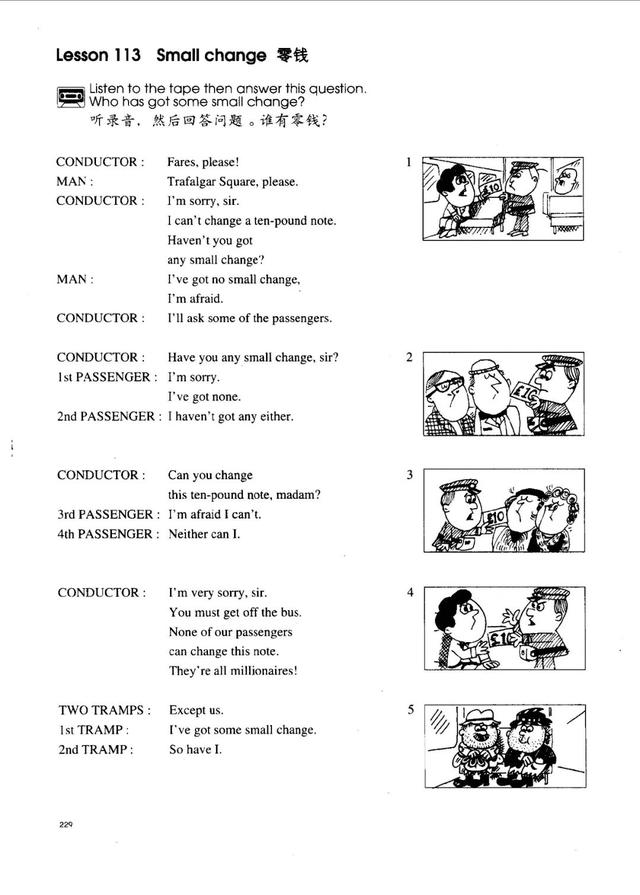【往期回顾】
一课一题一语法:新概念英语第1册第111-112课
下面是第111-112课的参考答案:
【答案】
1. 凯丽和乔一样高。
Kelly is as tall as Joe.
2. 凯丽和乔英语说得一样流利。
Kelly speaks English as fluently as Joe.
3. 这是我曾经看过的最没有意思的故事。
This is the least interesting story that I have ever read.

【本期内容】
下面我们继续本周《新概念英语1》第113-114课的重点句型或语法的分享。先来读一读第113课的课文:
一、课文原文

二、重点句型或语法
本课学习的是不定代词用法。此外,本课也要学习倒装句的用法。

(一)不定代词
本课侧重学习的是简单不定代词的用法,主要如下:
1、all与none
1)all
all表示“全部;所有”,用来表示三者或以上的所有人或物,可以后接可数名词的复数或不可数名词。如:all the students,all the bread。
all 可数名词复数,作主语时,视作复数,其谓语动词要采用复数形式,如:All the students are from France.
all 不可数名词,作主语时,视作单数,其谓语动词要采用单数形式,如:All the bread is made by my mother.
all也可以后接抽象名词,相当于the whole,如:He was working in the garden the whole afternoon yesterday.
此外,all如果单独使用,作主语的话,视作单数,如:All is ready.
all也可以与of连用,后接名词或代词,如:all of the students, all of them。
【注意】
all的否定表达是none。如果all与not连用,表达的是部分否定,如:All the students are not from France. (所有的学生不都来自法国。)
2)none
none表示“全都不”,用来表示三者或以上的人或物中一个也没有。
none如果单独使用时,多用来表物,如:There is none left. (什么东西都没剩下。)
none常和of连用,后接人或物,表示一个人或物都没有。作主语时,视作单数,如:None of this is new. / None of the students is from China. / None of them comes from Japan.

2、both、neither与either
1)both
both表示“两者都”,可以后接可数名词或不可数名词或代词。常与and连用,如:both the books and the pens, both air and water。
both也可以直接后接可数名词复数,如:both students。
both 名词,作主语时,视作复数,如:Both the books and the pens are Tom's. / Both air and water are very important to us.
both也可以与of连用,后接名词或代词,如:both of the twins, both of them。
both也可以单独使用,作主语时,视作复数,如:Both are very good.
【注意】
both的否定表达是neither。如果both与not连用,表达的是部分否定,如:Both of the students are not from France. (两个学生不都来自法国。)
2)neither
neither表示“两者都不”,可直接后接可数名词单数,作主语时,视作单数,如:Neither student is from China.
也可以与of连用,后接可数名词的复数,作主语时,视作单数,如:Neither of the students is from China.
neither可以单独使用,作主语时,视作单数,如:Neither is expensive.
neither常与nor搭配使用,表示“既不...,也不...”,它们所并列的成分如果作主语时,其谓语的单复数采取就近原则,即由nor后面的成分来决定谓语动词的单复数,如:Neither you nor he is fit for the job. / Neither he nor you are fit for the job.
3)either
either表示“(两者中)任意一个”,可直接后接可数名词单数,作主语时,视作单数,如:Either student is from China.
either也可以与of连用,后接可数名词复数,作主语时,视作单数,如:Either of the students is from China.
either也可以单独使用,作主语时,视作单数,如:Either is expensive.
either常与or搭配使用,表示“或者/要么...,或者/要么...”,它们所并列的成分如果作主语时,其谓语的单复数采取就近原则,即由or后面的成分来决定谓语动词的单复数,如:Either you or he is going there this afternoon. / Either he or you are going there this afternoon.

3、some与any
两者都表示“一些”,some一般用于肯定句,any一般用于否定句和疑问句,如:
There are some books on the desk.
There are not any books on the desk.
Are there any books on the desk?
【注意】
在疑问句中,如果表示委婉请求或希望得到对方肯定答复,常用some来表达,如:
Could you give me some water please?
Would you like some coffee?

(二)倒装句
本课还出现了由so或neither引导的倒装句的用法,表示“也(不)”。
so用于肯定句,其基本用法为:So 助动词 / 情态动词 / be动词 主语,如:
She has been there twice. So have they.
You can fly a plane. So can Jack.
He is a student. So am I.
neither用于否定句,其基本用法为:Neither 助动词 / 情态动词 / be动词 主语,如:
She has never been there. Neither have they.
You cannot fly a plane. Neither can Jack.
He is not a student. Neither am I.

三、一课一题
根据本课的重要语法点,让我们来练一练吧,把下列句子翻译成英语。
1. 那些学生没有一个喜欢绿色。
2. 所有孩子不都会游泳。
3. 这对双胞胎都有很多朋友。
4. 我们两个都不来自瑞士。
5. 这两支笔你可以任选一支。
6. 你能给我买一些花吗?







